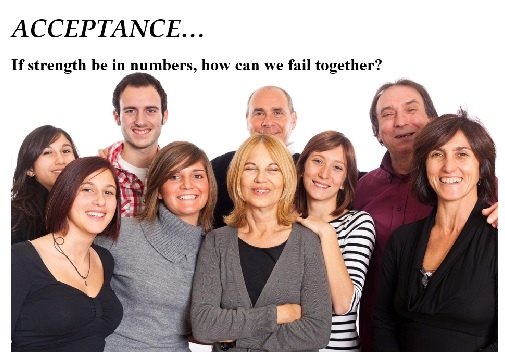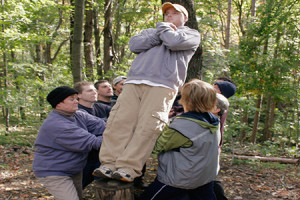It has long been the dream of dreamers everywhere to have a utopia of sorts, a true heaven on earth. If any in this group were to be asked what this might entail, I am fairly certain that the idea of a culture of acceptance would play well into that picture.
The “Three L’s”
- Losing the All Important Self
- Learning to Trust Others
- Living With the Risk of Failure
Let’s be honest, we all want to be included, to be loved, to be accepted. However, even though this is a seemingly universal desire, it is often the easiest thing to forego. When people gather, many instinctively, from long lost days of tribal behavior, flock together in protective cliques. When we do this, however natural the supposition may be, it is terribly detrimental to the “herd” at large, and will ultimately defeat the creation and sustenance of any type of atmosphere that lends itself to acceptance.
Losing the All Important Self
The notion that we can lose our “self”, the primordial desires that we are born with and which are reinforced by the group, is the foundation of the modern day idea of Cognitive Behavioral Therapy. Having its roots early on, the work of psychologist B.F. Skinner, among others, placed this system of self-control and a reshaping of ideals and areas of behavior firmly on the map still utilized by modern day therapist and motivational speakers.
Simply put, if I am able to limit my own desires, which might or might not be harmful to the successful formation of groups, then I have “lost the self”, and am now giving of my new “self” for the betterment of all involved! This is easier said than done, although I would argue that, even if a utopia is never achieved, the world at large– and especially your own inner circle– will be that much better off for your good efforts!
Learning to Trust Others
Perhaps one of the more difficult parts of the pragmatic approach, short of losing ourselves, is to learn to trust others. In this instance, we are not only trusting our peers for acceptance and support, but also for our own physical and mental well-being. This is also an important element of Cognitive Behavioral Therapy, and once mastered, is also immediately successful in empowering others to become stronger, just as we become stronger through trusting.
A useful exercise, which is often called upon at group retreats and outings, is to have each individual member of the group rely in some way on the entire group for his or her safety and continued success. This could involve “falling” backwards, only to be caught by colleagues; thus, trust is instilled. Any number of tactics can and are used to bolster this important element of successful group behavior, and places a premium on becoming less selfish, and more mindful to the needs and concerns of others. Accordingly, when we reach this point of learning to trust others, we automatically learn to also accept and nurture those within the group.
Living With the Risk of Failure
As we begin to accept others, and to then trust them with our future success; we will then learn to live with the risk of failure. To be clear, a risk of failing has always been present in our lives. And yet, as we accept and empower those around us, we are also granting them some degree of control over the chance that we may fail. By acknowledging that we fail, not only as individuals but also as a group, we must then admit that acceptance, empowerment, and the success that comes with such things are also collective in nature.
This, my friends, is most likely the most difficult– and most important lesson to be learned from accepting others. By doing so, we also learn to accept their faults; and by proxy– OUR faults. It then follows that IF we succeed, it is a group effort, and one that is only successful when we accept each other without reservation. By doing so, others in the group are forced to accept us. From this equation is borne a degree of acceptance and success that can only foster more of the same.
As we have seen, by practicing the “Three L’s”, we GAIN acceptance and success by:
- Losing the All Important Self
- Learning to Trust Others
- Living With the Risk of Failure
If strength be in numbers, how can we fail together?



